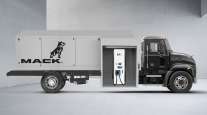Mack Trucks: Trump’s Tariffs Could Put Us at a Competitive Disadvantage

Back on March 23, 2017, President Donald Trump welcomed trucking industry representatives to the White House for a discussion on health care. During their visit, Trump, wearing an “I [heart] truckers” pin, climbed into the cab of a Mack truck parked on the lawn, pumped his fists and pretended to drive the stationary big rig. He then honked the horn six times in four seconds, luring laughs and cellphone snapshots from the onlookers in suits crowded around the truck.
Some things have changed since then. For one, the Trump administration finds itself in an intensifying trade war with other countries, including Europe — a battle putting pressure on the company that assembled the truck that Trump had so much fun in more than 15 months ago.

Carlos Barria/Reuters
That’s because Mack Trucks, which assembles its heavy-duty rigs in Lower Macungie Township (Pa.) and is owned by the Sweden-based Volvo Group, uses specially treated steel from Europe in its production process, spokesman Christopher Heffner confirmed. He wouldn’t disclose what specifically the imported steel is used for on the trucks, citing competitive reasons.
RELATED: Daimler Trucks' Martin Daum warns that tariffs will increase production costs
The Trump administration’s tariffs on European steel and aluminum means Mack is paying 25% more for that specially treated steel, and Heffner noted the company is unaware at this time of an appropriate American-made substitute. In addition, Heffner said, Mack already does buy a large amount of U.S.-produced steel, but those prices too are at risk of rising because, as a result of the tariffs, American manufacturers won’t be competing with lower-cost imports.
“Depending on how this issue evolves, being a U.S. manufacturer could become a competitive disadvantage,” Heffner said, noting, however, that the future of Mack’s Lower Macungie plant is not in jeopardy.
RELATED: Trump’s China tariffs risk costing US jobs, new study shows
While Trump campaigned on a promise to rewrite trade agreements and protect U.S. jobs from unfair foreign competition, a company such as Mack Trucks could get hurt because many of its peers manufacture trucks in Mexico, according to a June 21 article in The New York Times. Vehicles built in Mexico are not facing tariffs when imported into the United States, the article noted.

Luke Sharrett/Bloomberg News
The New York Times article used the situation at Mack Trucks to show how “the global nature of supply chains means the tit-for-tat tariffs are ricocheting in unexpected ways and may ultimately cost jobs in the United States.” It also noted the example of German carmaker Daimler AG, which said retaliatory tariffs from China will hurt the sales of the SUVs it builds in Alabama.
Some companies already have taken more drastic measures. Earlier this week, Milwaukee-based Harley-Davidson announced it would move the production of its motorcycles sold in Europe from the United States to facilities overseas, a move being made to avoid the retaliatory tariffs from the European Union on American exports. In a filing with the U.S. Securities and Exchange Commission, Harley-Davidson said the tariffs add about $2,200 to the average motorcycle exported from the United States to the European Union.
Mack, however, is the largest Lehigh Valley employer to date to talk about how the tariffs are affecting its business. While the company is now headquartered in Greensboro, N.C., Mack employs about 2,400 people at its assembly plant in Lower Macungie — a 1 million-square-foot facility in which $84 million has been invested in recent years to make it more modern, integrated and efficient.
Despite the tariffs, Heffner stressed Mack has no plans to move the plant’s work to another location.
“We have heavily invested in the [Lehigh Valley Operations] plant, and it is a key part of our U.S. industrial base,” he said.
But the increased costs for imported steel don’t come at a convenient time for Mack, which is ramping up production of its new highway truck, Anthem, and trying to grab a larger market share in North America. In the first quarter, Mack’s market share actually declined from 8.9% to 6.5%.
The plant, however, has plenty of orders to fill. Mack’s net order intake in North America increased 64% in the first quarter to 9,335.
Or, as Volvo Group CEO Martin Lundstedt described it to The New York Times, the plant is “packed with orders.” But, he told the newspaper, rising costs in the United States and a trade feud could hinder demand.
“It could be that if you have production in the U.S., you are punished,” Lundstedt told The Times.
Distributed by Tribune Content Agency, LLC




